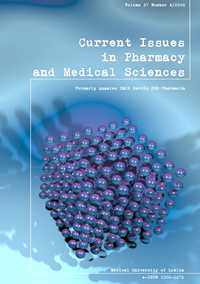The impact of gut microbiota on mental health
DOI:
https://doi.org/10.2478/cipms-2024-0037Keywords:
microbiota, microbiota brain-gut axis, depression, schizophrenia, bipolar disorder, autismAbstract
Microorganisms inhabit various areas of the human body, but by far the most numerous and diverse in species is the intestinal microbiota. This consists of an enormous number of microorganisms, the largest group of which are bacteria. Currently it is well known that microbiota affects the proper functioning of the brain, therefore, it has become the subject of interest in the field of mental diseases treatment. Numerous studies have shown both quantitative and qualitative disturbances in the composition of the intestinal microbiome in people suffering from depression. Psychobiotics are a category of probiotics that influence the gut microbiota and positively impact brain and nervous system function. The potential antidepressant role of psychobiotics is also indicated, however, presently, they do not have the status of drugs. It is well known that they induce various beneficial effects, such as reducing the level of cortisol and the activity of the hypothalamic-pituitary-adrenal (HPA) axis, as well as modulating the activity of the vagus nerve. Furthermore, the studies conducted so far allow to confirm the relationship between the composition and abundance of intestinal microflora and occurrence of various mental diseases, including: depression, schizophrenia, bipolar disorder, autism and attention deficit hyperactivity disorder (ADHD).
References
1. Chen Y, Zhou J, Wang L. Role and mechanism of gut microbiota in human disease. Front Cell Infect Microbiol. 2021;11:625913.
2. Góralczyk-Bińkowska A, Szmajda-Krygier D, Kozłowska E. The microbiota-gut-brain axis in psychiatric disorders. Int J Mol Sci. 2022;23(19):11245.
3. Vancamelbeke M, Vermeire S. The intestinal barrier: a fundamental role in health and disease. Expert Rev Gastroenterol Hepatol. 2017; 11(9):821-34.
4. Lazar V, Ditu LM, Pircalabioru GG, Gheorghe I, Curutiu C, Holban AM, et al. Aspects of gut microbiota and immune system interactions in infectious diseases, immunopathology, and cancer. Front Immunol. 2018;9:1830.
5. Weersma RK, Zhernakova A, Fu J. Interaction between drugs and the gut microbiome. Gut. 2020;69(8):1510-9.
6. Gomaa EZ. Human gut microbiota/microbiome in health and diseases: a review. Antonie van Leeuwenhoek. 2020;113:2019-40.
7. Ting L, Feenstra KA, Heringa J, Huang Z. Influence of gut microbiota on mental health via neurotransmitters: A review. J Artificial Intelligence Med Sci. 2020;1(1-2):1-14.
8. Generoso JS, Giridharan VV, Lee J, Macedo D, Barichello T. The role of the microbiota-gut-brain axis in neuropsychiatric disorders. Braz J Psychiatry. 2021;43(3):293-305.
9. Checa-Ros A, Jeréz-Calero A, Molina-Carballo A, Campoy C, Muñoz-Hoyos A. Current evidence on the role of the gut microbiome in ADHD pathophysiology and therapeutic implications. Nutrients. 2021;13(1):249.
10. Trzeciak P, Herbet M. Role of the Intestinal Microbiome, Intestinal Barrier and Psychobiotics in Depression. Nutrients. 2021;13(3):927.
11. Rădulescu I, Drăgoi AM, Trifu SC, Cristea MB. Neuroplasticity and depression: Rewiring the brain’s networks through pharmacological therapy. Exp Ther Med. 2021;22(4):1131.
12. Chang L, Wei Y, Hashimoto K. Brain–gut–microbiota axis in depression: A historical overview and future directions. Brain Res Bull. 2022;182:44-56.
13. Chen Y, Xu J, Chen Y. Regulation of neurotransmitters by the gut microbiota and effects on cognition in neurological disorders. Nutrients. 2021;13(6):2099.
14. Beurel E, Toups M, Nemeroff CB. The bidirectional relationship of depression and inflammation: Double trouble. Neuron. 2020;107(2): 234-56.
15. Liu RT, Rowan-Nash AD, Sheehan AE, Walsh RFL, Sanzari CM, Korry BJ, et al. Reductions in anti-inflammatory gut bacteria are associated with depression in a sample of young adults. Brain Behav Immun. 2020;88:308-24.
16. Huang YC, Shi X, Li ZY, Shen Y, Shi XX, Wang LY, et al. Possible association of Firmicutes in the intestinal microbiota of patients with major depressive disorder. Neuropsychiatr Dis Treat. 2018;14:3329-37.
17. Mangiola F, Ianiro G, Franceschi F, Fagiuoli S, Gasbarrini G, Gasbarrini A. Gut microbiota in autism and mood disorders, World J Gastroenterol. 2016;22(1):361-8.
18. Aroniadis OC, Brandt LJ. Przeszczepianie mikrobioty kałowej: przeszłość, teraźniejszość i przyszłość. Curr Opin Gastroenterol. 2013; 29(1):79-84.
19. Ma H, Cheng N, Zhang C. Schizophrenia and alarmins. Medicina (Kaunas). 2022;58(6):694.
20. Stępnicki P, Kondej M, Kaczor AA. Current concepts and treatments of schizophrenia. Molecules. 2018;23(8):2087.
21. Zhuang Z, Yang R, Wang W, Qi L, Huang T. Associations between gut microbiota and Alzheimer’s disease, major depressive disorder, and schizophrenia. J Neuroinflammation. 2020;17(1):288.
22. Generoso JS, Giridharan VV, Lee J, Macedo D, Barichello T. The role of the microbiota-gut-brain axis in neuropsychiatric disorders. Braz J Psychiatry. 2021;43(3):293-305.
23. Grande I, Berk M , Birmaher B, Vieta E. Bipolar disorder. The Lancet. 2016;387(10027):1561-72.
24. Gondalia S, Parkinson L, Stough C, Scholey A. Gut microbiota and bipolar disorder: a review of mechanisms and potential targets for adjunctive therapy. Psychopharmacology. 2019;236:1433-43.
25. Sukmajaya AC, Lusida MI, Soetjipto, Setiawati Y. Systematic review of gut microbiota and attention-deficit hyperactivity disorder (ADHD). Ann Gen Psychiatry. 2021;20(1):12.
26. Checa-Ros A, Jeréz-Calero A, Molina-Carballo A, Campoy C, Muñoz-Hoyos A. Current evidence on the role of the gut microbiome in ADHD pathophysiology and therapeutic implications. Nutrients. 2021;13(1):249.
27. Aarts E, Ederveen T, Naaijen J, Zwiers MP, Boekhorst J, Timmerman HM, et al. Gut microbiome in ADHD and its relation to neural reward anticipation. PLoS ONE. 2017;12:e0183509.
28. Barrio C, Arias-Sánchez S, Martín-Monzón I. The gut microbiota-brain axis, psychobiotics and its influence on brain and behaviour: A systematic review. Psychoneuroendocrinology. 2022;137:105640.
29. Drzewiecki A. The impact of diet on microbiota – a diet beneficial to intestinal health; 2024. [https://instytutmikrobiomiki.pl/mikrobiota-jelitowa-czym-jest-i-jaka-role-pelni/]
30. Kurek J. Psychobiotics in clinical practice. Medycyna po dyplomie. 2023;1.
31. Sharma R, Gupta D, Mehrotra R, Mago P. Psychobiotics: The next-generation probiotics for the brain. Curr Microbiol. 2021;78:449-63.
Downloads
Published
Issue
Section
License
Copyright (c) 2024 Authors

This work is licensed under a Creative Commons Attribution-NonCommercial-NoDerivatives 3.0 Unported License.


